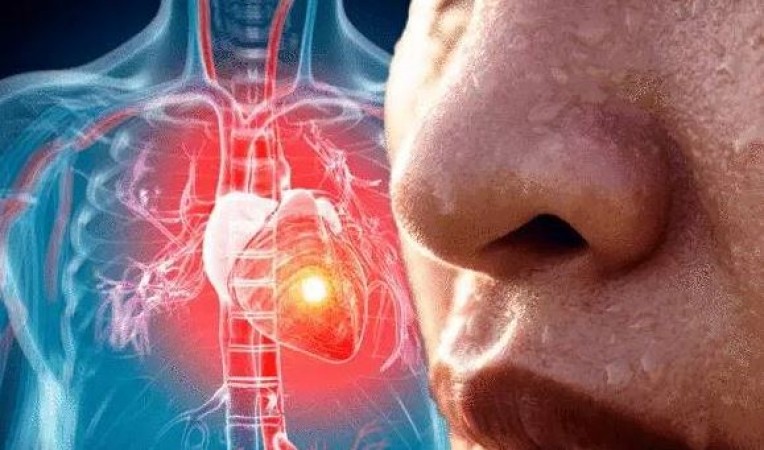
Heart attacks, also known as myocardial infarctions, are serious medical (How to cause a heart attack) emergencies that occur when the blood flow to the heart muscle is significantly reduced or blocked, usually due to the buildup of plaque in the coronary arteries. Recognizing the warning signs of a heart attack is crucial for timely intervention, as quick medical attention can mean the difference between life and death. While chest pain is widely known as a common symptom of a heart attack, there are other subtle indicators that should not be ignored. One such indicator is excessive sweating, which can play a vital role in identifying a heart attack and seeking prompt (How to cause a heart attack) medical care.
The Link Between Heart Health and Sweating:
Sweating is a natural bodily function that helps regulate body temperature. It is commonly associated with physical activity, hot weather, or emotional stress. However, when excessive sweating occurs suddenly and without an apparent cause, it can signal an underlying health issue, including heart problems. The heart plays a central role in pumping oxygen-rich blood to the body's organs and tissues. If the heart muscle is compromised due to reduced blood flow, it can lead to insufficient oxygen supply to various parts of the body, triggering a stress response that includes excessive sweating.
Excessive Sweating as a Warning Sign:
Excessive sweating during a heart attack is often referred to as diaphoresis. It goes beyond the normal sweat response and is characterized by a cold, clammy sweat that is not alleviated by environmental factors like heat or physical exertion. This type of sweating is generally accompanied by other symptoms such as chest pain or discomfort, shortness of breath, nausea, and lightheadedness. It is important to note that excessive sweating alone may not necessarily indicate a heart attack, but when it occurs in combination with other symptoms, it should be taken seriously.
Understanding the Mechanism:
The connection between excessive sweating and heart attacks lies in the autonomic nervous system, which controls involuntary bodily functions, including sweating. When the heart's blood supply is compromised, the body's fight-or-flight response is activated. This triggers the release of stress hormones, such as adrenaline, which can lead to various physiological changes, including increased heart rate, elevated blood pressure, and excessive sweating. The body's aim is to increase blood flow to vital organs, but this can manifest as cold and clammy sweating due to the constriction of blood vessels in the skin.
Differentiating Between Types of Sweating:
It's important to distinguish between the different types of sweating to recognize the potential warning signs of a heart attack. Normal sweating, also known as physiological sweating, occurs in response to heat, physical activity, or emotional factors. This type of sweating is usually accompanied by a rise in body temperature and is not typically a cause for concern. On the other hand, pathological sweating, including excessive sweating related to a heart attack, occurs suddenly, is not dependent on external factors, and is often accompanied by other cardiac symptoms.
Other Possible Causes of Excessive Sweating:
While excessive sweating can be a warning sign of a heart attack, it's essential to consider other potential causes as well. Some medical conditions, such as hyperhidrosis (a disorder characterized by excessive sweating), anxiety, infections, and hormonal imbalances, can also lead to profuse sweating. Therefore, a comprehensive evaluation of symptoms and medical history is necessary to determine the underlying cause accurately.
Recognizing the Signs and Seeking Help:
Recognizing the signs of a heart attack, including excessive sweating, can be life-saving. If you or someone you are with experiences sudden and unexplained excessive sweating, along with symptoms like chest pain, shortness of breath, nausea, and lightheadedness, it's crucial to take immediate action. Call emergency services (911 or your local emergency number) without delay. If you are at risk for heart disease due to factors like age, family history, smoking, high blood pressure, diabetes, or high cholesterol, it's especially important to be vigilant about any unusual symptoms.
Excessive sweating can be an early indicator of a (How to cause a heart attack) heart attack, a serious medical emergency that requires prompt attention. While chest pain is a well-known symptom of a heart attack, the presence of excessive sweating, particularly cold and clammy sweating, should not be overlooked. Understanding the connection between heart health and sweating, as well as differentiating between normal and pathological sweating, can help individuals recognize potential warning signs. Timely recognition and appropriate action, such as seeking emergency medical assistance, can make a significant difference in the outcome of a heart attack. Staying informed about these subtle yet crucial symptoms can empower individuals to take control of their heart health and potentially save lives.
Fertilizers for Kharif Planting; States Urged to Counter Urea Diversions: Mandaviya
Health Benefits of Bhutta During Rainy Days: 8 Reasons to Enjoy Corn Daily